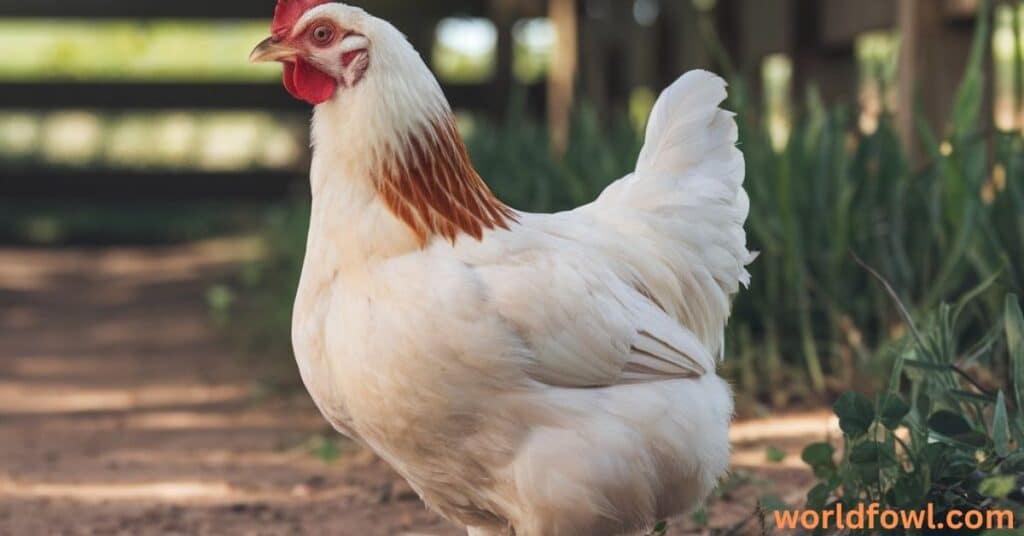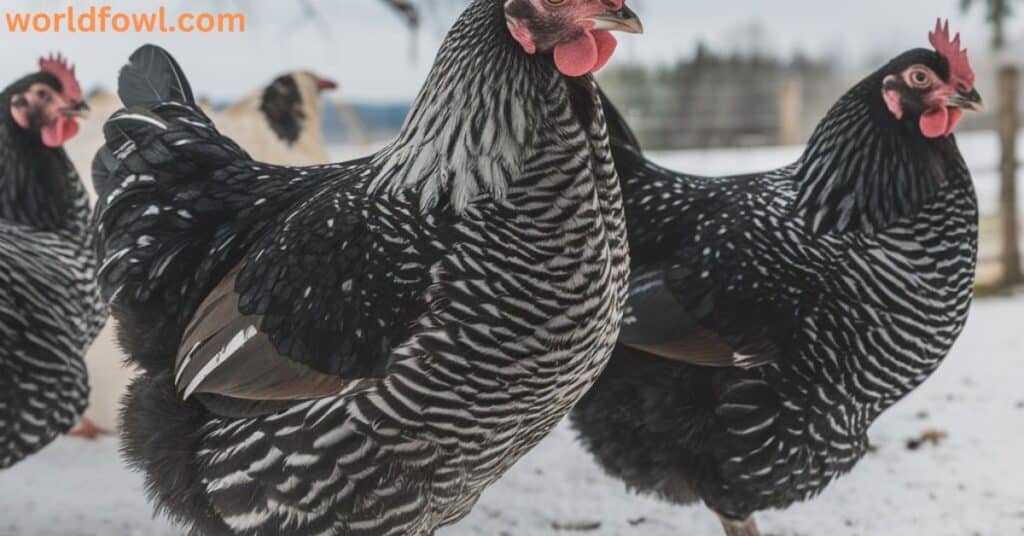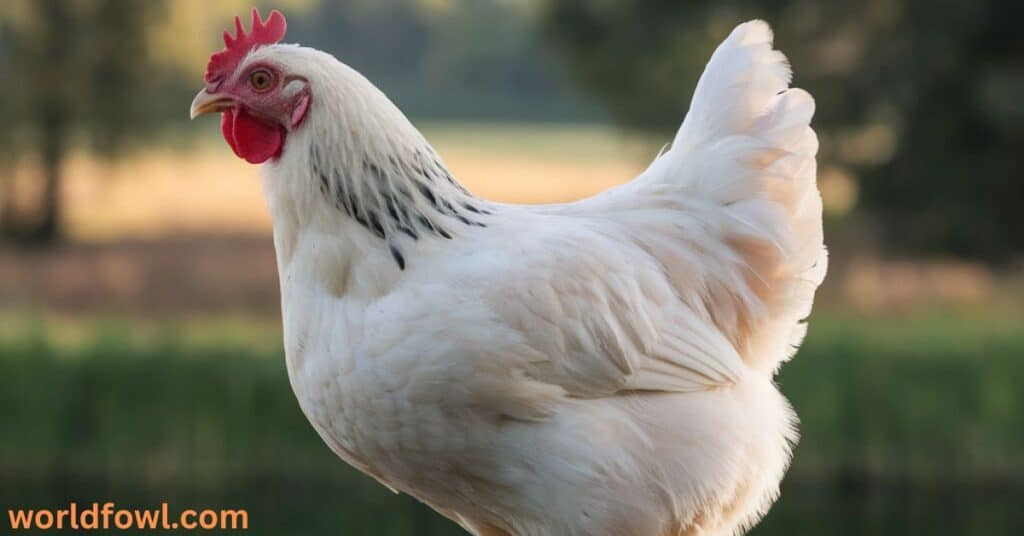The Plymouth Rock Chicken is one of the most beloved and enduring breeds in the world of poultry. Whether you’re an experienced farmer, a backyard chicken keeper, or someone just looking for a reliable egg-laying breed, the Plymouth Rock is a solid choice. Known for its distinctive appearance, calm temperament, and excellent egg-laying capabilities, the Plymouth Rock chicken is the ultimate all-rounder. This in-depth guide explores the history, characteristics, behavior, egg production, care requirements, and everything else you need to know about the Plymouth Rock Chicken.
The Roots of the Plymouth Rock Chicken: A Rich History

The history of the Plymouth Rock Chicken dates back to the early 19th century in the United States. This breed was developed in Massachusetts, named after the historic Plymouth Rock where early settlers landed. It is often considered one of the first true American heritage chicken breeds.
Birth of a Barnyard Star
In the early 1800s, American poultry enthusiasts were looking for a breed that could serve multiple purposes, from egg-laying to meat production. Farmers needed chickens that could adapt to the New England climate and provide reliable eggs throughout the year. The Plymouth Rock chicken was developed through the crossing of several breeds, including the Rhode Island Red and Dominique chickens. These breeds were known for their hardiness and ability to thrive in cold weather, making them ideal for the diverse conditions across the United States.
The Plymouth Rock became an instant favorite because it could thrive in the often harsh New England winters and still produce eggs in large quantities. It wasn’t long before this breed spread across the United States and was officially recognized by the American Poultry Association (APA) in 1874.
Here’s a table summarizing key information about the Plymouth Rock Chicken:
| Attribute | Details |
|---|---|
| Breed Name | Plymouth Rock Chicken |
| Other Names | Barred Rock (common variety) |
| Origin | United States (Massachusetts) |
| Recognized By | American Poultry Association (APA) |
| Primary Use | Dual-purpose: Egg-laying and meat production |
| Egg Production | 200-280 eggs per year (medium-sized brown eggs) |
| Egg Color | Brown |
| Egg Size | Medium |
| Temperament | Friendly, curious, calm, non-aggressive |
| Size (Weight) | Roosters: 7.5-8.5 lbs (3.4-3.9 kg), Hens: 6.5-7.5 lbs (2.9-3.4 kg) |
| Feather Pattern | Barred (black and white stripes), also available in Blue, Silver-Penciled, and White varieties |
| Cold-Hardiness | Excellent—adaptable to cold climates |
| Lifespan | 5-8 years |
| Broodiness | Low (not particularly broody, but can hatch chicks if necessary) |
| Noise Level | Moderate (roosters have a gentle crow) |
| Personality | Calm, docile, easy to handle, good with families and other chickens |
| Disease Resistance | Moderate—generally hardy but still requires proper care and disease prevention practices |
| Housing Requirements | Minimum of 4 square feet per bird in the coop, need safe outdoor space for free-ranging |
| Feeding Requirements | Requires a balanced diet with access to layer feed, fresh vegetables, and occasional protein-rich treats |
| Poultry Show Recognition | Recognized by poultry exhibition standards in the Barred Rock variety, can participate in shows |
This table encapsulates the essential traits and characteristics of the Plymouth Rock Chicken, making it easier to reference all the key facts about this breed at a glance.
See Also : White Leghorn Chicken Breed: The Ultimate Guide
Striking Features of the Plymouth Rock Chicken

The Plymouth Rock Chicken is one of the most visually distinct breeds. From its beautifully patterned feathers to its graceful posture, it’s a breed that commands attention in any flock. Whether you raise these chickens for their appearance, their temperament, or their productivity, you’ll find that the Plymouth Rock chicken is truly a standout.
Feather Fashion: The Iconic Barred Pattern
One of the most notable features of the Plymouth Rock chicken is its barred feathers. This pattern consists of black and white stripes running horizontally across the chicken’s plumage. The unique feather pattern is what gives the Plymouth Rock its characteristic “rock” appearance, and it’s one of the main reasons why this breed is so popular with poultry enthusiasts.
Though the barred feather pattern is the most well-known, Plymouth Rock chickens also come in several other variations, including:
- Blue Plymouth Rock: Featuring shades of blue feathers, this variation is highly prized for its unique coloring.
- Silver-Penciled Plymouth Rock: This type has a fine penciled feather pattern in silver and black, giving it a more delicate and elegant look.
- White Plymouth Rock: The white variety is solid white without any bar patterns, offering a cleaner, more uniform appearance.
The barred feathers of the Plymouth Rock make it easily identifiable and quite beautiful. Additionally, it’s worth noting that this breed has a thick feather coat, making it a cold-hardy poultry breed capable of withstanding colder temperatures.
Size Matters: Weight and Physical Characteristics
The Plymouth Rock Chicken is a medium-sized breed, making it suitable for a variety of living conditions. These chickens are large enough to provide a good meat yield, but they are not so large that they require excessive space or special care. Understanding the size of the Plymouth Rock chicken is crucial for providing proper chicken care requirements and chicken coop setup.
- Roosters: The typical Plymouth Rock rooster weighs between 7.5 to 8.5 pounds (3.4 to 3.9 kg). Their muscular build, strong legs, and broad chest make them an excellent option for dual-purpose livestock.
- Hens: The female Plymouth Rock is slightly lighter, with a typical weight range of 6.5 to 7.5 pounds (2.9 to 3.4 kg). Despite being slightly smaller, they are sturdy, reliable, and excellent egg layers.
Their stature is medium, with a broad body and a long, well-arched neck. Plymouth Rocks are known for their upright posture and elegant stance. Their deep, rounded chest and short, thick legs add to their robust and healthy appearance.
See Also : Can Geese Attack Humans? Geese Gone Wild
Personality Plus: Temperament and Behavior
Plymouth Rock chickens are known for their friendly and docile nature, which makes them a fantastic addition to family farms and backyard flocks. Their temperament is one of the reasons why they remain one of the most popular chicken breeds today.
Friendly and Curious
Plymouth Rock chickens are curious and friendly birds. They are not skittish, which makes them relatively easy to handle. Whether you’re a seasoned chicken keeper or a beginner, you’ll find that Plymouth Rock chickens enjoy human interaction and can become quite attached to their caretakers. Unlike other breeds that can be more aloof, Plymouth Rocks often seek attention and will readily follow you around, making them ideal family-friendly chickens.
Their friendly demeanor extends to their interactions with other chickens as well. They are non-aggressive, which makes them great companions in a mixed flock. Even when other breeds challenge them, Plymouth Rocks tend to avoid conflict, sticking to their calm and gentle ways.
Flock Dynamics
When introducing Plymouth Rock chickens to an existing flock, it’s important to remember that they tend to be lower in the pecking order. Plymouth Rock chickens are not aggressive and will often allow more dominant breeds to take the lead in the flock’s social structure. However, they are still strong and robust enough to assert themselves when necessary.
In general, Plymouth Rocks are an excellent addition to any backyard chicken flock due to their harmonious nature. They do well in both large and small groups, and their peaceful demeanor means they won’t cause disruptions within the flock.
Noise Levels
While rooster crowing noise is something to consider when raising chickens, Plymouth Rock roosters are typically quieter than other breeds. While they will crow in the morning, their crowing is not particularly loud or disruptive. If you live in a suburban area or have close neighbors, Plymouth Rock chickens are a good option since their noise levels won’t be as bothersome as some of the more boisterous breeds.
See Also : Are Seagulls Protected? A Guide To Seagull Rights
Egg Production: What to Expect from Your Plymouth Rock Chickens

One of the most appealing aspects of raising Plymouth Rock chickens is their excellent egg-laying abilities. If you’re looking for reliable egg production numbers, the Plymouth Rock chicken won’t disappoint.
Egg Color and Size
Plymouth Rock hens lay brown eggs, typically medium in size. Their eggs are consistent in size and color, with the shell being a warm brown hue. The eggs are of good quality, with firm whites and rich, flavorful yolks, making them a fantastic option for egg-layers in a backyard poultry setup.
Egg Production Numbers
When it comes to egg-laying, Plymouth Rock hens are very reliable. You can expect Plymouth Rock hens to lay between 200 and 280 eggs per year, depending on environmental factors like diet, lighting, and overall care. While they may not be the highest producers when compared to breeds like the Leghorn or Australorp, Plymouth Rocks are still excellent egg-layers, especially for smaller or family-owned flocks.
These chickens are also fairly consistent in their egg production, meaning you can count on them for a steady supply of fresh eggs throughout most of the year. They may lay fewer eggs during the winter months, as many chickens are less productive when the days are shorter, but with proper lighting and care, you can maintain consistent egg production year-round.
Factors Affecting Egg Production
Several factors affect egg production in Plymouth Rock chickens, including:
- Diet: A well-balanced diet that includes protein, calcium, and other essential nutrients is critical for optimal egg production. Ensure your hens have access to commercial layer feed and provide fresh vegetables and occasional protein-rich treats.
- Lighting: As with all egg-laying chickens, Plymouth Rock hens require adequate lighting to maintain egg production. In the winter months, supplemental lighting can help maintain consistent egg production by mimicking longer daylight hours.
- Health: Healthy chickens are productive chickens. Maintaining proper chicken health and nutrition will help ensure that your Plymouth Rocks lay eggs consistently. Regular health checks, parasite prevention, and vaccinations are all part of maintaining good flock health.
See Also : How Do Penguins Mate? The Complete Guide To Penguin Love
Cold Weather Warriors: The Resilience of Plymouth Rock Chickens

One of the standout features of the Plymouth Rock Chicken is its ability to thrive in colder climates. Due to their thick feather coats and hardiness, Plymouth Rock chickens are considered one of the best cold-hardy poultry breeds.
Cold-Weather Hardy Chickens
Plymouth Rock chickens are well-suited for colder climates thanks to their dense feathering and solid build. These chickens are able to tolerate lower temperatures, and they can be kept outdoors even in winter, as long as they have access to a well-ventilated coop. It is important to remember that while Plymouth Rocks are hardy, they still need protection from extreme cold and wind, particularly in regions that experience harsh winters.
Plymouth Rocks also tend to remain productive even in colder weather. While their egg production may drop slightly, they continue to lay eggs during the winter months as long as they are properly cared for.
Disease Resistance
Along with their cold-weather hardiness, Plymouth Rock chickens are also known for their disease resistance. While they are not immune to all diseases, they are less prone to common poultry illnesses than many other breeds. However, proper poultry disease prevention practices, including vaccination, sanitation, and parasite management, should always be followed to maintain a healthy flock.
See Also : Do Owls Hibernate In The Winter? Owl Hibernation Myths and Facts
Housing and Space Requirements: Keeping Your Plymouth Rock Chickens Happy

To raise happy and healthy Plymouth Rock chickens, it’s essential to provide them with the proper housing and space. Proper chicken coop setup and run requirements will ensure that your Plymouth Rock chickens live a long, productive life.
Chicken Coop Setup
Plymouth Rock chickens need a spacious, well-ventilated chicken coop setup. To accommodate these medium-sized chickens, provide at least 4 square feet of space per bird inside the coop. This ensures that they have enough room to move around without overcrowding, which can lead to stress and health issues.
Make sure the coop is secure and safe from predators, especially if you live in an area with raccoons, foxes, or other predators. Adding a secure run or fenced-in area allows your Plymouth Rocks to roam freely during the day while staying safe at night.
Free-Range Chickens
Plymouth Rocks are excellent free-range chickens. They enjoy foraging and scratching the ground for insects, seeds, and plants. Allowing your chickens to roam freely in a secure yard or run adds to their overall well-being and can improve their diet. When free-ranging, ensure that the area is well-protected from predators and has ample shelter to protect the chickens from the elements.
See Also : Parakeet Spiritual Meanings and Symbolism
Frequently Asked Questions (FAQs) about Plymouth Rock Chickens
Are Plymouth Rock chickens good for beginners?
Yes, Plymouth Rock chickens are ideal for beginners. They have a calm and friendly temperament, making them easy to handle and interact with. Their non-aggressive nature and hardiness to various climates also make them a low-maintenance option for novice chicken keepers. Whether you’re raising chickens for the first time or looking to expand your flock, Plymouth Rocks are a great choice.
How many eggs do Plymouth Rock chickens lay?
Plymouth Rock hens typically lay between 200 to 280 eggs per year, depending on factors like age, diet, lighting, and overall health. They produce medium-sized, brown eggs, and while they might slow down slightly in the winter months, they are reliable egg layers. If you’re looking for consistent egg production, the Plymouth Rock chicken is a solid option for your flock.
Can Plymouth Rock chickens tolerate cold weather?
Yes, Plymouth Rock chickens are known for being hardy in cold climates. Their dense feathering and sturdy build make them one of the best cold-hardy poultry breeds. They can thrive even in freezing temperatures, provided they have a secure and well-ventilated coop to protect them from the elements. These chickens are particularly well-suited for areas with harsh winters.
What is the difference between Plymouth Rock and Barred Rock chickens?
The term Barred Rock often refers to a specific variety of the Plymouth Rock chicken. Both the Barred Rock and Plymouth Rock share the same heritage and similar physical characteristics, such as the iconic black-and-white barred feathers. The primary distinction is that “Barred Rock” typically refers to the traditional, most common variety with barred feather patterns, while “Plymouth Rock” can refer to any of the variations, including the Blue, Silver-Penciled, or White types. In short, Barred Rocks are simply a subset of the Plymouth Rock breed.
Are Plymouth Rock chickens good for meat production?
Yes, Plymouth Rock chickens are considered dual-purpose chickens, meaning they can be raised for both eggs and meat. While they may not be as large as some other meat-specific breeds like the Cornish or Jersey Giant, they still provide a decent yield. Their meat is flavorful and tender, making them an excellent choice for small-scale meat production on a homestead or farm.
Do Plymouth Rock chickens require a lot of space?
While Plymouth Rock chickens are medium-sized, they do require a decent amount of space to thrive. A good rule of thumb is to provide at least 4 square feet of space per bird inside the coop. Additionally, if you allow them to free-range, they will benefit from having access to a secure yard or outdoor area where they can forage and exercise. Providing adequate space will help keep them healthy, happy, and productive.
Conclusion: Plymouth Rock Chicken
The Plymouth Rock Chicken is a fantastic breed for those seeking a hardy, friendly, and reliable poultry breed. Whether you’re looking for egg-laying chickens, dual-purpose chickens, or simply a breed that’s easy to care for, the Plymouth Rock fits the bill. Its gentle temperament, adaptability, and beautiful feather patterns make it a favorite among poultry enthusiasts.
Before you bring Plymouth Rock chickens into your flock, make sure you understand their chicken care requirements, including their need for space, good nutrition, and proper housing. With the right environment and care, your Plymouth Rock chickens will thrive, providing you with fresh eggs, healthy birds, and a rewarding poultry-keeping experience.

Henry James is a seasoned blogger and a passionate storyteller on “World Fowl.” With years of experience crafting engaging content, he brings a unique blend of expertise and creativity to his writing. Henry specializes in exploring diverse topics with depth and clarity, captivating readers worldwide.







